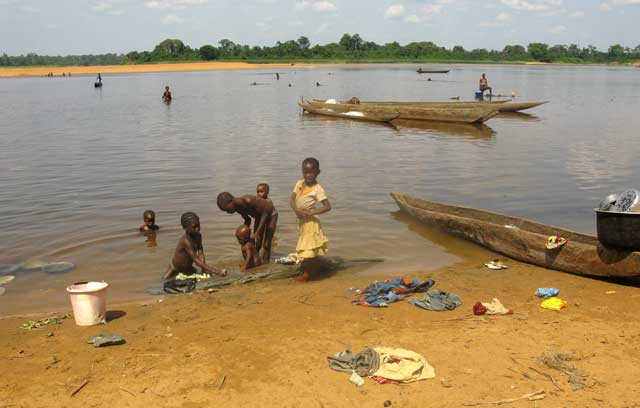The Fetish Room: The Education Of A Naturalist, By Redmond O'Hanlon & Rudi Rotthier, trans. Jane Hedley-Prole

This is a very odd but also engaging book. For a start, it is not written by Redmond O'Hanlon, despite his name appearing as one of the authors. Rudi Rotthier has written a profile of O'Hanlon and the publishers have clearly decided it will get more attention if thought to be autobiographical. The book is quite revealing enough. Indeed, one of the attractions of O'Hanlon is that, while some English travel writers value discretion to the point of self-effacement, he has always been both candid and funny.
His first book, Into The Heart Of Borneo, was memorable for the practical jokes he played on the natives and on his companion, the poet James Fenton. At one point O'Hanlon persuaded his tribal head-shrinking friends to creep up on the unsuspecting poet when he was asleep and leap on him, shouting, "get his head". Fenton was not amused.
Further light-hearted exploits followed in the Amazon, and then came the book he had always wanted to write, Congo Journey, now seen as a Penguin Classic. It is "my magnum opus", he tells Rotthier, and it took him seven years to complete. Into this book he poured his passion for natural history. A darker streak started to emerge, mixed with sorcery and fear: "You're scared. You've got a damp crotch the whole time... The jungle is wonderfully chaotic; it's a place that you can never master, never fathom."
As The Fetish Room reveals, O'Hanlon had plenty of darkness to draw on from his own past. His religious mother beat him and later, in a bizarre incident, sneaked into his rooms at Oxford while his father distracted him, so that she could burn all his books and paintings. When O'Hanlon returned, he found nothing left on his shelves but a single volume of Wordsworth, the only one of his books she approved.
At Oxford, he became friends with a generation of successful writers: Ian McEwan ("scarily fit, very competitive"); Martin Amis ("like McEwan, used to smoke a fair amount of dope. Equally competitive"); and James Fenton.
O'Hanlon took Bruce Chatwin along to one gathering, who was keen to impress. He "did everything he could to attract Fenton's attention. [In a high plaintive voice]: 'When I visited Somerset Maugham, we were standing by the pond. He took me from behind and fucked me on the spot.' Fenton opened a lazy eye. Then shut it again."
Chatwin did not come back. O'Hanlon was more successful with the group and remained close to many of his gifted contemporaries. One reason for his own literary success is that he is that rare thing among travel writers, a genuine naturalist who doesn't just sprinkle his prose with wildlife for local colour. Long before the recent revival in natural history writing, O'Hanlon was pursuing species with passion and rigour. A new genus of cleric beetle has been named after him (the "ohanlonella esperanzae rifkind", although like this book it has been co-authored).
Rotthier is a Flemish journalist and author who once interviewed O'Hanlon and has now expanded the commission to book length. He accompanies O'Hanlon on a circuitous wander around England, eliciting revealing comments about his subject's past and disconcertingly bland comments about the country's.
At first, one might suspect a more post-modern writer than O'Hanlon of having made the Rotthier character up. A Belgian who lacks Poirot's powers of deduction, he is good at having a beer and listening to some well-honed anecdotes. A nice Boswellian moment comes when the pair meet a journalist from the New Yorker and Rotthier realises with a pang of jealousy that O'Hanlon tells the same stories to everybody. But Rotthier's approach proves strangely effective. He can ask guileless questions about class and family that a British companion might be hesitant about; his persistence in taping some 60 hours of interviews is impressive. And O'Hanlon's answers are brutally honest.
There is an edge to proceedings. O'Hanlon is now in his early sixties; his wife Belinda is ill in hospital. The urge to travel has deserted him. "When you get into your late 50s... you don't have enough energy to fight your past. It bursts through a kind of dam and threatens to drown you." Thoughts of his difficult parents who despised literature overwhelm him. He dreams of books and wakes up angry. He seems always to have had a rebellious streak. At Marlborough, he rode a motorcycle around the quad ("but they couldn't expel me because I was about to be Hamlet in the school play"). At one low moment, O'Hanlon tells Rotthier, "sometimes in the morning I think what a pity it is that I didn't die in the night".
Depression and natural history have often gone hand in hand. Richard Mabey, author of some of the finest naturalist books of recent years, has written of his long battles with the black dog. Darwin, O'Hanlon's great hero, spent years after the Beagle wrestling with mental demons and an illness O'Hanlon thinks was psychosomatic.
It is Darwin who animates much of O'Hanlon's writing. The books he dreams of are first editions of the Origin Of Species. The Victorian sage's combination of endurance travelling, scientific rigour and slow authorship is one he has followed.
The "Fetish Room" in his house is where Redmond keeps the objects that most stir his imagination: the eggs he collected as a boy; a monkey's finger from the Congo. O'Hanlon goes there before writing, to prepare himself. This anthropological ritual seems fitting for our most primal of travel-writers, whose sustained body of work pays homage to the origins of species.
Hugh Thomson's 'Tequila Oil: Getting Lost in Mexico' is published by Phoenix
Join our commenting forum
Join thought-provoking conversations, follow other Independent readers and see their replies
Comments